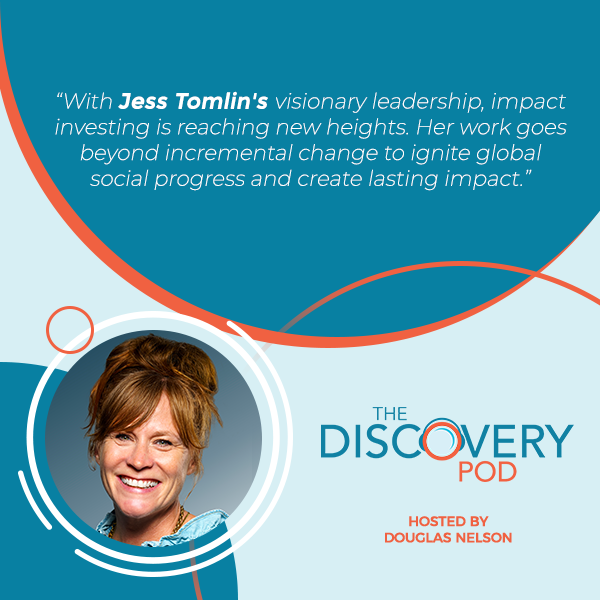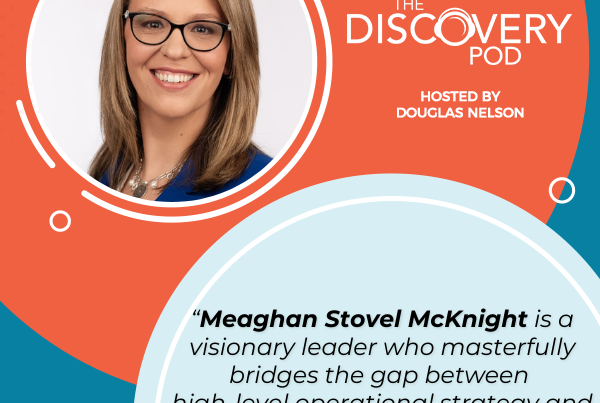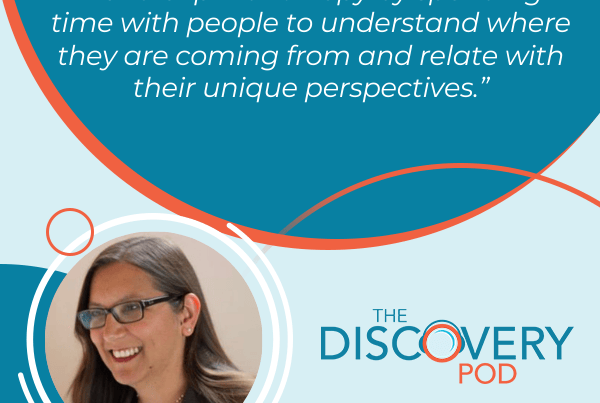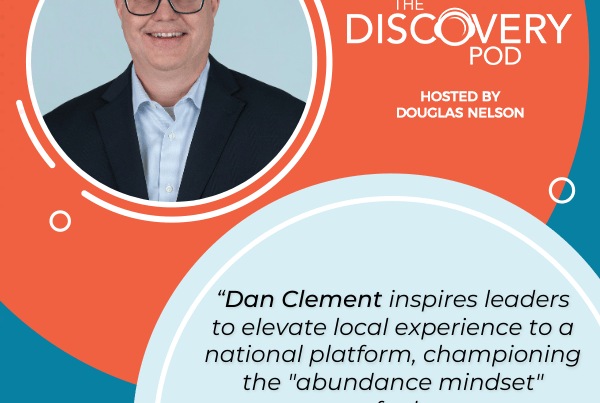
The Equality Fund is redefining the way we invest in gender justice by combining philanthropy, grant-making, and impact investing. Join Douglas Nelson as he sits down with Jess Tomlin, CEO of the Equality Fund. In this insightful conversation, they explore the transformative power of feminist philanthropy, the importance of funding women-led initiatives, and the role of the Equality Fund in reshaping global investment strategies to drive gender justice. Tune in and be inspired by the challenges and exhilarating possibilities of building a truly equitable world!
—
Listen to the podcast here
Equality Fund With Jess Tomlin, CEO
My guest this week is Jess Tomlin. Jess is the CEO of the Equality Fund, where she leads an effort to resource feminist movements around the world, working to change systems, shift power, and dismantle barriers. Prior to her role with the Equality Fund, Jess led the recreation of the Match International Women’s Fund, Canada’s only global fund for women. She is a leader recognized around the world for her work and for the vision that she has brought to the Equality Fund as the CEO.
If you’ve read a newspaper, if you’ve looked at TikTok, or if you’ve looked at Twitter anytime in the last couple of months, the work that the Equality Fund does around the world has been challenged by changes in the world environment. As you’ll hear Jess say time and time again, human-powered movements are the only things that have ever brought us truly transformative change in the history of humanity. Her confidence in that principle and her dedicated work to that is an inspiration. Her approach to leading her team and continuing to fund in the face of great adversity is a lesson and an opportunity for learning for all of us. I was so grateful that she took the time to join us on the show, and I’m very excited to share our conversation with you.
—
Welcome to the show.
I’m thrilled to be here, Doug. Thank you.
What Equality Fund Is And Whom It Serves
Jess, we’re going to have a wide-ranging conversation over the next half hour, but let’s start with what I think is most important for our readers to know at the outset. Tell us a little bit about the Equality Fund, what it is, and who you serve.
The Equality Fund is a Canadian innovation for the world. First and foremost, it is a model that has been designed by human rights activists across the world in recognition of the fact that people-powered movements are the only thing that has ever really brought about transformative change. Those movements need fuel, and that fuel is a lot of things. One of the really important pieces of fuel is money.
People-powered movements are the only things that have ever really brought about transformative change. Share on XWe have for a long time recognized that transformative change laws, policies, systems, and behaviors are the kinds of things that change in decades and lifetimes and not the kinds of things that change in project cycles. The Equality Fund was conceived as a bold backer of human rights movements for decades and longer, really as an ally and an accomplice to the people who are at the grassroots and who are on the ground, who are doing very brave work throughout the world.
The Equality Fund, I think, has been in the dreams and the imaginations of many feminists for a long time who have been aspiring for a gender equal world. It came together with leading thinkers and dreamers from the entire ecosystem. Movement leaders from across the global South, Canadian leaders, politicians, venture capitalists, corporate finance folks, and government people all came together and built what is, I think now, one of the largest human rights institutions in the world.
It was seed-funded by the Canadian government with a $300 million contribution just under five years ago. That $300 million contribution was an invitation to leverage and crowd in a variety of different forms of funding so that we could effectively create a significant base of support that would go the long game and be alongside these activists for decades. Also, it would be secured by virtue of the fact that we were removing that dependency on one funder or on one relationship, would crowd in a multitude of actors who were using their capital in all sorts of ways to the best of its ability.
I don’t usually lead with that, Doug, because there’s a lot that we’re doing on the impact side, the change makers on the ground we support. In the last four years, we have moved $100 million out the door to 1,000 partners in 100 countries, all leading at the forefront of change, whether that’s pop-up abortion clinics whether that’s underground support for LGBTQ activists in Ghana. Whether that’s training police in Eastern Africa on rape crisis interventions.
Whether that’s shelters for women who are fleeing violence in Iraq. There are countless examples. Fundamentally, what Equality Fund’s purpose is to generate significant financial momentum to fuel and power those movements who are doing that work. It has been a real success. So far, so good. It’s big. The scale of what we’re trying to do is intimidating, but what I have learned is that when you start big, you attract big.

Equality Fund: When you start big, you attract big.
We have been able to bring in the largest philanthropic institutions in the US who have boldly made commitments alongside the government of Canada and the UK government individuals. The other piece that I would just say before I end my very long, winded intro. The other thing that I would say is that Doug is one of the biggest problems that we have in philanthropy, and the social impact sector is that we’re constantly trying to put out the fire with philanthropic capital, which is an important and vital form of capital because it takes risk, it moves quickly.
There’s so much about philanthropy that’s helpful. Philanthropy is about 70 billion of the overall financial picture, and you’ve got seven trillion or whatever that is in capital markets. Sometimes it feels like we’re trying to solve the problems created in our society in part through capitalism and all these other forms of extractivism with philanthropy. It does feel sometimes like we are not using the full toolkit. The Equality Fund, from the beginning, decided we were not going to do that.
With that $300 million contribution and other investments that we’ve been able to crowd in, we’ve built a 100% gender lens impact investment portfolio across the entire ecosystem of our portfolio, whether that’s private markets, public markets, private debt, public debt, etc. We screen every single thing that we invest in through the lens of human rights and through the lens of a number of other factors related to climate. We are living our values across the entire continuum of capital that we have the privilege of stewarding, whether on the investment side or on the grant-making side.
Defining Success In Impact Investing
I want to come back to that because what you just said sounds like a fairly straightforward thing, but I have worked with a number of organizations that have really struggled to be able to get to that, to increase the percentage of their portfolios that are in that impact investing space. That is an exceptional achievement that you just outlined there. As you’re talking about the work of the organization, you give a number of examples.
When you’re leading this system change, when you’re fueling this transformative change, social change across the world, the examples are helpful. They make it human, and they make it real. In your position, you see the hundred million dollars deployed. How do you think about what success looks like? How do it’s working on any given Tuesday?
I actually think this is one of the greatest challenges that social movements have had in terms of articulating impact and success. In part, that’s because we get all up in our words, and we’re political animals. We try to really get it right. I also think it’s very hard to measure progress, as I said, in a project cycle. I used to work in the UN, and I used to work in international institutions, and it was very clear how many bed nets we were able to deliver and, therefore, how many lives were saved because those children did not get malaria.
That is a vital and important thing. When you’re talking about changing women’s roles in the household and then you’re talking about their financial security and then you’re moving to their ability to be nominated for political office, and then you’re supporting that leader to bring transformative laws and policies in their new seat as a politician, for example, that is the work of lifetimes. I often reference the civil rights movement, which we’re very much still in, but it’s not like racial justice was solved in a decade.
Now more than ever, and I’m sure we’ll come to this where we’re seeing a tremendous amount of pushback and backlash, which I actually think is a sign of progress because of the level of agitation and acceleration of progress has been so significant over the last two decades. We find ourselves in a really interesting moment from the impact perspective. We have seen that by directly investing in grassroots leaders and organizations on the ground, they are so well positioned to seize opportunity and respond to crisis.
One example is the Green Wave in Latin America, where we’ve seen major changes in Colombia, in Argentina, in Mexico that have, in some cases, enshrined abortion rights into the Constitution. It was because those movement actors were working at it for decades, 30 years. They were able to work collaboratively together across these geographies. They were the ones set precedents that others could then build from. They had political strategies.
They were networked and connected. Last year and the year before came these revolutionary moments that were decades in the making. It is a challenge for our sector. The winds are great when we get them, but they are under the surface like icebergs and that slow steady, holding ground, which in and of itself is an essential thing to fund and breaking ground, that is a cycle. Of course, we see these beautiful small wins, whether that’s in Mongolia. We supported a group of organizations who spent a decade trying to increase women’s participation in politics.
The wins are great when we get them, but they are under the surface like icebergs—slow, steady, and decades in the making. Share on XThey forced a change in the way in which the political disbursement of leadership was calculated. They are up to a third of women in the Mongolian political infrastructure now. They’re going for half. It’s been a couple of decades in the making as well. I love that question because I think we’re not great at answering that question, but every opportunity that I can get, I really want to get under the surface of like, actually, we need bed nets. We absolutely do. We need to change laws and policies and systems and behaviors and norms and attitudes and beliefs.
That is the stuff that we have to trust people who are most proximate to the issues to navigate, and it’s really hard to unlearn, and it’s really hard to relearn. Those are the things that take time. What I love about what we’re trying to do at Equality Fund is just like recognize that from the outset. Give flexible unrestricted support to those partners, ideally for up to a decade so that they are just able to move through their leadership journey, seize opportunities, respond to crisis, catalyze change, build momentum, build support without the confines of having to demonstrate that they’ve reached all their impact objectives in the first year.
Balancing Short-Term And Long-Term Goals
There’s something very powerful about the time horizon that you offer those organizations and that you’re building for your own organization. I’m curious how that long-term view plays out in the quarterly board meeting. As you’re putting, here’s our plan for the next twelve months. Remember, we’re working on a decade or longer time frame. Here’s what we’re going to do in this first year. How do you manage to stay focused on the immediacy of what’s in front of you while maintaining that perspective to the horizon?
It’s funny. I would say at the board level, the political assignment of the Equality Fund is very well understood. They know that we are here to galvanize momentum and support for this work. They recognize that movement work and human-powered movement work is something that is going to be a long game. If they’ve come to work on the board, they understand, and they’re excited by the Equality Fund being a financial innovation for the field that will accelerate and support this progress.
That has not been so much of an issue. What I would say is though it is both an art and a science. Working with the funding partners that we have. We work with two G7 countries. We work with very large philanthropic institutions. We work with individual high-net-worth donors. We work with women who give $30 a month or less and have been doing it for 50 years. We work with a range of investor types who support us across a number of fields.
We work with movement leaders from around the world. They’re all at the same table. That has been a really interesting experience. I’ve learned a lot about leadership, common values, and common purpose in being part of that board table. I would say the impact stuff that is on us is really significant. We see that as our job. It is our job to make that funding flow more easily to movement partners who might be operating on an annual budget. The average annual budget of a women’s rights organization globally is $20,000.
What they don’t need to be doing is sending us quarterly reports every quarter with their taxi receipts. It is our job to minimize that burden, but we take that burden on. When you are working with partners who, for example, are governments, they have extremely high expectations of diligence, reporting, compliance, risk, systems, etc. It’s less the board, and it’s more trying to demonstrate that impact early and often with our many partners who are. This is an experiment for everyone.
It must be fascinating. Fascinating is a word that someone from the outside can use. It must be fascinating.
Interesting in Canada.
Managing Multiple Timelines As A CEO
It sounds very interesting. Managing the very different timelines and very different levels of expectations and probably some very different senses of urgency around the work. As CEO, how do you balance all of those different timelines, all of those different training schedules that run right through your desk?
I don’t know that I do very well, honestly. I am somebody who is very comfortable with ambiguity. You know those like personality evaluations that you take. Actually, when I was working at CARE, somebody did one for me, and it has since been reconfirmed. The woman sat across from me she’s like, “You have an unhealthy level of comfort with ambiguity.” “What can I do with this?” I do think you have to be able to sit in that gray layer if you’re driving something that is systems changing and trying to break the mold.

Equality Fund: You have to be able to sit in that gray layer if you’re driving something that is systems-changing and trying to break the mold.
There’s one on any given day. We’re seeing a rise against the crisis in Gaza. There’s news coming out of Sudan. Just this morning, there are so many things going on in the world. At the same time, the sector at large is crumbling around us with major changes, particular with the world the US is going to play. It is steady as you go. Just trying to be as supportive as possible. One of the things that I have come to learn is that, actually, in crisis comes opportunity. My former board chair gave me the word called crisis tunity, which I love.
Crisis tunity.
We look for that now. I look for that because in crisis, and I have witnessed this in my own work in the middle East and in Africa and in leading the equality fund in crisis, the silos get busted. The creativity can actually be more profound. The barriers to entry and the barriers to connecting and working together are lowered. The momentum and energy are higher. In crisis, it can be. I don’t want to understate how devastating it is, but it also can be an opportunity for us to get our stuff together. I don’t know the swearing protocols on this podcast, so I won’t do it.
I think we get a few before we get that explicit rating, but we’d probably have more readers if we had an explicit rating. Just feel free to go ahead, particularly as you move into this next part of the conversation. Before we get into what’s going on in the world now and what does it mean for the sector and the work of the Equality Fund in our conversation over the last 25 minutes or so or 20 minutes or so.
Urgency Vs. Incremental Change In Equality Work
You have used a very even tone of voice to describe what is a really big transformation of the societies in which you’re operating. You’ve made it sound like the obvious next step is as day follows night. Your choice of language comes through as it really does have a great deal of urgency in it. How do you balance that need to be long-term and understand the incrementalism that you’ve described with the urgency of the work that you and your organization are supporting around the world?
Don’t get me wrong. We’re responding to the urgency. We just have no expectation that the urgent won’t be urgent five years from now. We anticipate when we come to the table that we’re looking at decades worth of doing and undoing. We do that through our funding. There’s a lot of funding, for example, that moves specifically to crisis, to organizations and movements and grassroots organizations who are in crisis. Whether that’s Gaza, whether that’s Iraq, whether that’s Sudan, whether that’s Somalia, whether that’s Ukraine.
We find and target the organizations on the ground who are actually the ones who are responding before the aid infrastructure even gets there. Before the food aid, before the industrial complex and the systems arrive if people need to eat, they go to the women’s organization and the women’s organization feeds them because they have a community garden in the back or whatever. If, as we see when we see escalation in violence because of war or conflict, we know that means more violence in the home.
We know that the violence that women and girls, sexual and otherwise, experience is escalated significantly in conflict. Those organizations are already there. They’re not coming in to respond to the crisis. They are adapting to their real-life circumstances and responding to the needs of their community. In a way, those organizations are already within our fold, and we already have those relationships. It may be a matter of accelerating or increasing our support. It may be a matter of looking at other things in our toolkit, like what can we do from a policy perspective.
Are there governments that need to know what’s going on? Are there other institutions that need to be aware? Do you want to stay quiet? Do you want to speak loudly? What can we do to accompany you during this difficult period? Do you just need us to, like, cut you a check, stay quiet, let us know when you need us? The urgency piece is very real, but the organizations are the ones that are grappling with that.
Global Challenges And The Fight For Equality
That’s a really important perspective to share. I hope our readers gather the role of that long-term funder. You can move decisively to respond to the crisis, but you’re not at the tip of the crisis. I think a number of the organizations that I get to work with through my work here at the Discovery Group is often a crisis for one is a crisis for all. It’s in all the alarms go and everybody runs on deck and what can we do, which is often the fastest way to make a crisis worse by letting go of what you’re doing on a regular basis. We’re talking about the crisis, so let’s talk about what’s happening.
Anything in particular, like what’s happening in this humdrum world of ours?
Wouldn’t it be nice to be bored by the headlines for just a couple of days?
Just a day, yeah.
Particularly in the changes in the USA that are happening under the Trump administration around the world, increasing authoritarianism, the pushback against equality in so many different ways. It’s terrifying. It’s demoralizing for so many. You’ve made so much progress as an organization, and still, the headlines are what the headlines are. What goes through your mind when you look at the New York Times or the Globe and Mail in the morning?
I feel like we take this question in a bunch of different ways, and there are probably several parts, but this is, hands down, the most painful and difficult time I have ever experienced in my life. I would say that sentiment is shared very broadly. There is what’s happening in the US, and there’s the carry-on effect of what’s happening in the US and the permission that has been giving to other countries and what that means. I think we’re all sitting here thinking about how this all happened and how we got here. There’s a lot of thinking to do.
There’s a lot of reflection. There’s a lot of looking back to history. I fundamentally believe, Doug, though, that the reason we are in this moment is that we need to recognize that this is a major moment of backlash. One of the things that we do in our granting agreements with our partners is when we look at impact, they talk about all the things they achieve. They also signal signs of backlash. They signal signs of backlash because we acknowledge that is part of progress.
That any time you’re really trying to fundamentally shift the status quo, there’s always going to be two steps forward, one step back. The more you agitate and the more successful you agitate, the stronger the backlash is. In some ways, when we are on the brighter side of the street in full recognition that these changes in the world order will impact millions and millions of people’s lives. This is like a meta version of backlash because of the success of the agitation and progress that people-powered movements have led for the last two decades.

Equality Fund: The more successful the agitation for change, the stronger the backlash, but backlash is a part of progress. Any time you shift the status quo, there will always be two steps forward, one step back.
I see it that way. I’m also very scared. Just the US alone, whether that’s private philanthropy being called in to report on its endowments or whether that’s the $70 billion moving out of the aid sector because USAID is all but closed down, that will have an incredibly real impact on people’s lives. I used to work for USAID. I worked for PEPFAR, which was an incredible organization that supported HIV treatments and antiretroviral treatments for people living with AIDS in Sub-Saharan Africa at the time.
I witnessed every single day how many people were on life-saving drugs, whether or not that program will continue as TBD. There are 30 million people on PEPFAR-funded antiretroviral drugs. When you start to look at the immediate impact this is going to have on the most structurally excluded, the most poor, the most marginalized. It is almost beyond scope. I also worry about the carry-on effect. I worry about trends and permissibility. Is that a word? I have a thing where I make up words sometimes.
It’s clear.
That’s giving to other governments in the Netherlands, in Germany, in many countries in Africa, Ghana, and Uganda. You name it, where this anti-woke rhetoric and this anti-progress is gaining steam and gaining acceptance and tolerance because it’s being tolerated so beautifully in the US. That is a trend to watch and one I think that really will put democracy on the line for many in the years to come. The whole sector is in a shape-shifting moment.
How we resource this work is just but one question I think we’re grappling with, which is in part why I’m so proud of what we’re building at the Equality Fund because it was built outside of government, outside of any direct funding relationship with one partner or another. The money that Equality Fund stewards is 100% accountable to movement partners, and it is not vulnerable to shocks.
You were built for this.
We were built for this. That’s literally our tagline. Did somebody tell you to say that? When all of this stuff started to come down, we were like, “Looking to this is a podcast, so you cannot see the video, but like looking behind our shoulders.” It was like, “No, this is exactly what we were built for.” Something that was not vulnerable to the political shifts or the philanthropic whims that would be able to sustain funding over the long term. That could do that with total liberation, independence, autonomy with one line of accountability, and that’s two movements. That’s what we were built for. Now more than ever, we seem to be one of the few who have that privileged liberation. We are not vulnerable to shocks in the way that so many others are.
Staying Focused On The Long-Term Vision
There’s freedom because you have the money. There’s the freedom because you have the independence, which insulates you from some of the power and gives you power of your own. You have spent the last five years focusing so much on looking to the long term, looking to the horizon. It’s one of the reasons I was asking and so curious about how you think about the concept of urgency because balancing today versus ten years from now or five years from now can be quite challenging for organizations. I would imagine it’s harder than ever to stay focused on that ten-year horizon. As CEO, how do you approach that? How do you give that pep talk to yourself or give that pat on the back to yourself and to the colleagues that are around you on a daily basis?
The folks that I have the privilege to work with at the Equality Fund feel very privileged, and so do I. We are not fighting losing battles to save projects and partners. We are not trying to play politics and trying to get under the radar, get over the radar, or any of that. We are in the privileged position to be able to focus on the work and understand what is the most valuable thing that the Equality Fund can do. I have colleagues from around the world. I have a dear colleague who is watching the news and watching her family in Gaza every day. We have colleagues who are living these lives that are so inextricably linked to the crisis and the tragedy that’s playing out in our world, whether even in the US or elsewhere.
Folks whose very identity is being questioned. Folks who no longer belong to the countries they were born in. These people inside the Equality Fund don’t come to this job because it’s a great paycheck. They come because they’re deeply purpose-driven individuals. The privilege of being able to actually focus on the work is really powerful. I don’t feel like I need to give myself a pep talk. The work is tremendous sometimes, and I’m very tired sometimes, but I don’t need to rally behind my why. I don’t think the team does, either.
It’s inspiring to hear you talk that way. It’s inspiring to know that you and your team are doing that. Again, from an outsider’s perspective, there is so much momentum that had been generated that is now at risk. As that independent funder, I’m sure there’s some value in the consistency of your funding to just be the one that isn’t changing in the midst of so much change.
Don’t get me wrong. I think we’re all seriously despondent and depressed and like drinking from the muzzle velocity fire hose that is the new cycle, and all of those things are true. I would just say that the fact that we get a place to channel our energy is very powerful. I do think that that’s a privilege. I’m not fighting to keep the lights on at the same time as I’m trying to move money to the Ukraine or to any number of groups who are really at the front lines of the crisis. I do think for a team like the Equality Fund, they understand that.
It doesn’t mean they’re not tired, and it doesn’t mean they don’t cry in their soup, and it doesn’t mean they’re not so inextricably linked to the work that they can never get a real break. I think all of those things are true. If given the choice between not and being able to step into my full power and my leadership and be able to move my energy through this work. It makes me feel that’s a privilege and that’s a gift because we all need somewhere to put that.
Looking Ahead: Hopes For The Future
That’s really an important reflection for leaders of all types of organizations across Canada and around the world. Jess, what are you looking forward to?
I think what I’m looking forward to, and I alluded to it before with my like flippant crisis tunity phrase, like I think people are still in shock. I am starting to see these glimpses of bad a**, super bold, really creative, very unexpected thinking ideas and initiatives that I think are very energizing for our movements. One of the things about the women’s rights space, the gender equality space, is that it is so scarce. Not in terms of ideas and brilliance and ingenuity and innovation and all that stuff, but in terms of resources. I said that to you.
The women's rights space is not scarce in ideas, brilliance, ingenuity, or innovation, but in resources. Share on XThe average annual budget is $20,000 a year of women’s rights organizations globally. They have been driving change and leading progress on a shoestring for decades and centuries. What that has meant is that within that industrial complex, they have to compete for funding. The people working on gender-based violence are doing one thing, and the people working on women’s economic empowerment are doing another thing. Very often, they’re competing for very small pools of funding.
I think this moment is forcing this movement that I am accountable to like bust the silos. When we pan out even further, there’s no reason why those barriers and silos cannot be busted even further with adjacent movements who are doing incredible work on climate, on racial justice, on indigenous rights, on land reform. The future of AI and all of these bodies of work can be accelerated once we bust through those barriers and move out of our silos.
I feel like the urgency and the magnitude of the moment is forcing that to happen. I want to be part of those ideas and creative outbursts and conversations. I think it’s what’s required. It’s like all hands on deck. I don’t think we’re there quite yet. I think people are still recovering. I do feel like that’s the way of the future. I’m starting to see those glimpses and sparks everywhere. At the end of the day, the only thing that has ever brought about transformative change is people-powered movements.
This world will be run by eight broligarx. It just isn’t what’s going to happen because the people will revolt. It will happen. That is the only thing in the history of time that has ever truly brought about change. My bet’s on movements. We’re licking our wounds, and we’re going to get creative and level up. I know that that sounds aspirational, but I’m starting to see it, and I think I’m here for it.
Jess, I am so glad that you and your colleagues at the Equality Fund are here for it. I look forward to watching you as you identify those sparks and those opportunities in the future and cheer from the sidelines. Thank you so much for the work that you do every da,y and thank you for being on the show.
Doug, it’s my absolute pleasure. Thanks for the conversation.




